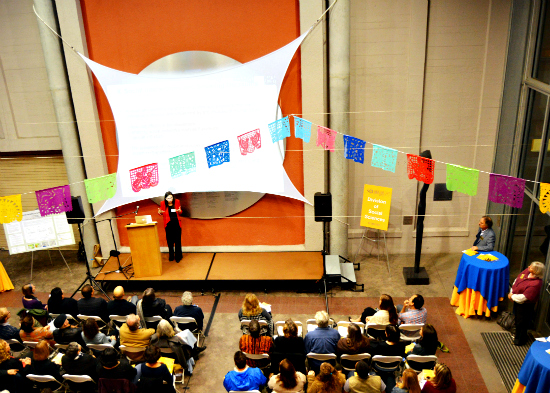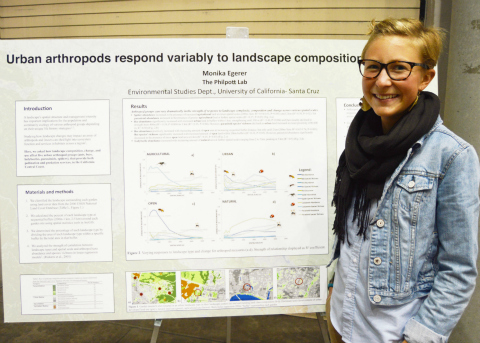An economist using biology to analyze New York City crime. A psychologist discussing street art. A geographer talking about the business of farming. An environmental scientist documenting how predatory animals’ fear of humans affects their behavior. These were among the unique talks at the UC Santa Cruz Division of Social Sciences’ third annual Research Frontiers event Thursday, Nov. 5.
The Santa Cruz Museum of Art & History was filled with campus and community members as seven speakers from six social science disciplines gave mini lectures on how collaborative scholarship can address contemporary issues.
Alison Galloway, campus provost and executive vice chancellor, and Sheldon Kamieniecki, dean of social sciences, offered opening remarks. “The social sciences is where innovation meets ambition,” Kamieniecki said, adding how scholars in the division push the edges of their fields to challenge dominant assumptions.
Natalia Lazzati, who joined the economics department earlier this year as an assistant professor, delivered the keynote. Lazzati said her research “asks questions that are not supposed to be addressed by an economist.” She has looked at problems of hotspot policing, crime in New York City, and currently, the impact of social interaction on smoking.
“The most striking aspect of economics is not the subject matter itself but the conceptual framework we use to approach the problem of study,” Lazzati said.“ We can also benefit from other views.”
Strawberry growers’ predicament
Also speaking was Julie Guthman, a trailblazer in the field of food studies, whose latest research looks at California’s lucrative strawberry industry and its challenges. Producers must deal with restrictions by lenders and insurers, drought-stressed plants and virulent pest problems, also difficult subleases with vegetable growers, Guthman said.
Coupled with a dependency on extremely toxic fumigants, a squeeze of high land values and low prices, and proprietary technologies, fixes are hard to come by. “The best solutions for the industry may not be best for California,” Guthman said.
Transitioning to organic is a growing trend but producers face additional problems. Among them, organic soil requires longer rotation. Brassica varieties such as broccoli work best to naturally kill harmful microbes, but farmers find that no one wants as much as they can grow.
Guthman’s light-hearted suggestion: “So if you like strawberries, eat more broccoli.”
Assimilation and non-citizenship
Catherine Ramírez, a professor in Latin American and Latino studies and director of the UCSC Chicano Latino Research Center, presented her latest research about assimilation and non-citizenship, the topic of a book she is writing.
She shared the story Jakadrien Turner, an African American 15-year-old runaway from Texas who, after being arrested, assumed the false alias of an undocumented Colombian woman to avoid charges and ended up being deported. Ramírez argued that the example of Turner, who could be mistaken for Latino, shows how assimilation can cross race and identities.
Thanks to a grant from the Andrew W. Mellon foundation, Ramirez will be exploring this topic further in a series of events throughout 2016.
Russia, children, bugs, and pumas
Melissa Caldwell, professor of anthropology and editor of Gastronomica: The Journal of Critical Food Studies, delivered a talk titled “Living Faithfully in an Unjust World: Practicing Kindness in Today's Russia.”
Regina Day Langhout, associate professor in psychology and the provost of Oakes College, spoke on about “Children, Mural Making, and Participatory Action Research: How Children Made a Difference at their School.”
Stacy Philpott, the Ruth and Alfred Heller Chair in Agroecology, associate professor in environmental studies, and interim executive director of the Center for Agroecology and Sustainable Food Systems, talked on “Urban Gardens: Sources of Beans, Bees, and Benefits.”
Chris Wilmers, an associate professor in environmental studies, discussed “How Predators’ Fear of Humans Shapes Their Behavior and our Ecosystems.”




